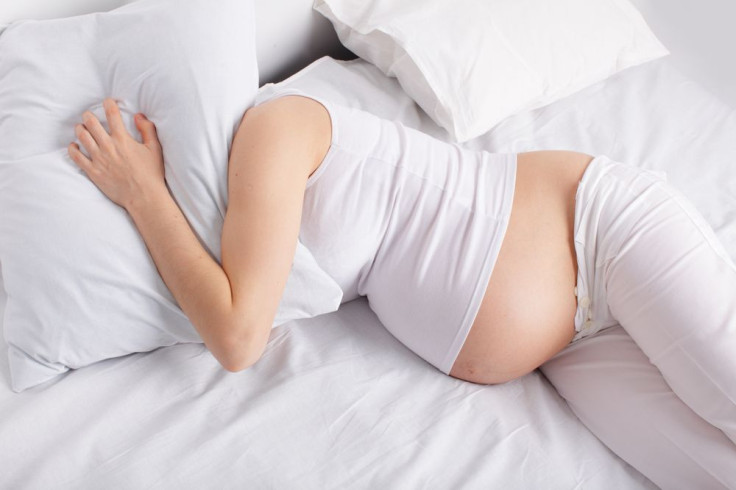Pregnant Mothers' Depression May Alter Babies' Brain Development; Moms-To-Be Transmit Mood, Anxiety Disorders To Fetuses

Pregnancy may be a stressful and overwhelming time for mothers-to-be. Thoughts about whether they will be a good mom, if the baby will be healthy, and if they can financially support their newborn, begin to consume the minds of pregnant women. These worries can lead to a wide range of emotions such as depression and anxiety that could affect the well-being of the infant. According to a recent study, babies born to pregnant moms with depression are likely to experience alteration in brain development, increasing their vulnerability to mental illness.
It is common during pregnancy for expectant mothers to experience mood swings because of the changes in hormone levels such as estrogen and progesterone. The American Pregnancy Association says the significant hormonal changes can affect the level of brains chemicals that regulate mood, known as neurotransmitters. Typically, these pregnancy emotions are present during the first trimester between six to 10 weeks and then again in the third trimester as the body begins to prepare itself for birth.
Mood swings that become more frequent and intense lasting more than two weeks could lead to a serious health issues for the mother and the baby. As depression is the most prevalent in women during their childbearing years, this increases the risk for pregnant women to develop the condition leading to maternal depression. This form of depression could transmit mood and anxiety disorders to a growing fetus with the alteration of their amygdala.
Publishing in the journal Biological Psychiatry, a team of researchers at the University of Singapore, examined the association between prenatal maternal depression and the variation in the fetal development of the amygdala. A cohort of Asian mothers at 10 to 13 weeks of pregnancy were recruited to be assessed for maternal depression in the study. The participants’ newborns were then analyzed to observe any changes in the structure of their amygdala and its pattern of neural connections.
One hundred and fifty-seven pregnant women were asked to complete a depression questionnaire during their 26th week of pregnancy and were then assessed for depression using the Edinburgh Postnatal Depression Sale. Their nonsedated, 6 to 14-day-old newborns underwent magnetic resonance imaging scans to determine the structure of their amygdala. Afterward, diffusion tensor imaging scans were used to analyze the amygdala’s pattern of neural connections.
The findings revealed the volume of the amygdala did not differ between the infants regardless of their mothers’ depression status. However, the connectivity, or the amygdala’s “wiring” was significantly reduced or abnormal in the right amygdala of the infants who were born to mothers with high levels of depression.
The University of Colorado at Colorado Springs says brain abnormalities such as an abnormal amygdala are typically seen in depressed individuals. Amygdala blood flow and metabolism are found to be positively correlated to the severity of depression. Since the hypothalamus is controlled by the amygdala, an abnormality in amygdala expression can lead to behavioral changes such as insomnia, anxiety, decreased grooming, and sexual behavior. Depression in pregnant mothers may transmit mood and anxiety disorders to their child as early as fetal life increasing their vulnerability to mental illness.
"The notion that maternal depression might influence the brain development of their babies is very concerning,” said Dr. John Krystal, Editor of Biological Psychiatry in the press release. “The good news is that this risk might be reduced by systematic screening of pregnant women for depression and initiating effective treatment."
In a similar study published in the British Journal of Psychiatry, researchers found women who are depressed during pregnancy are more likely to have an unhealthy diet that can negatively impact a child’s cognitive functioning later in life. Prenatal maternal depression symptoms relate to both increased unhealthy and decreased healthy prenatal diets. A mother’s diet during pregnancy directly influences the nutritional atmosphere of the fetus, which will affect brain development.
The findings of both studies suggest not only should pregnant women be helped to adopt a healthier diet but also have interventions that target maternal depression in the early stages of pregnancy. This will ensure better physical and mental health outcomes for the mothers, and infants once they are born.
To learn how to cope with mood swings during pregnancy, click here.
Sources:
Bai J, Chen H, Chong YS, et al. Prenatal Maternal Depression Associates with Microstructure of Right Amygdala in Neonates at Birth. Biological Psychiatry. 2013.
Barker ED, Jensen SK, Kirkham N, et al. Prenatal Maternal Depression Symptoms, Prenatal Nutrition and Child Cognitive Function. British Journal of Psychiatry. 2013.



























